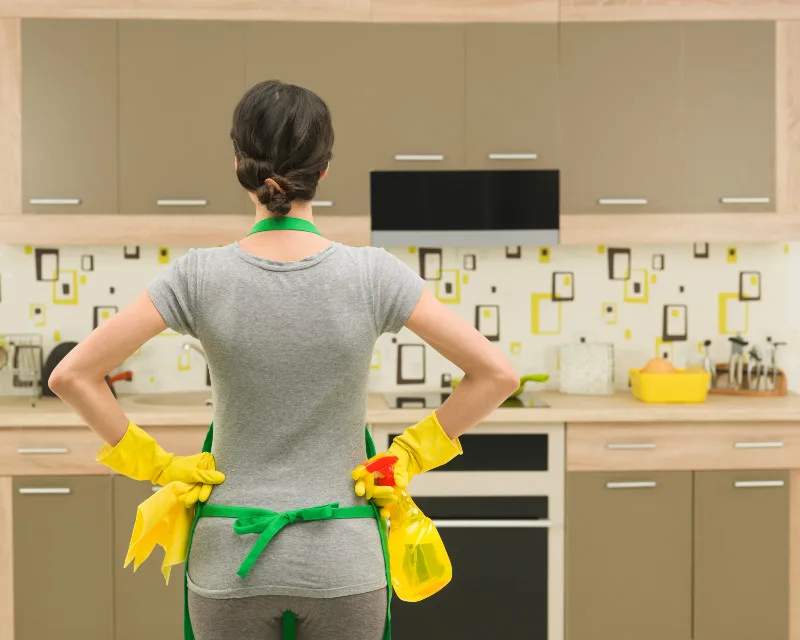
One of the complaints I hear most often from people is that while the cooking is OK, the cleaning afterward makes them crazy.
I get it, I really do. You’ve made a meal for everyone, they’ve eaten (or not), and then you have to kick back into high gear to clean it all up. Or, perhaps even worse, before cleaning you have to do bedtime duty. You finally get the kids down for the night, only to come back to a messy kitchen when all you want to do is collapse. It stinks…
But it doesn’t have to! While I don’t have a fairy godmother who can come in and do the cleaning for you (if you figure out how to get one of those, please let me know!), I do have some tricks that can help to make the cleaning after cooking easier and less of a chore.
8 Tricks to Make the Cleaning After Cooking Easier
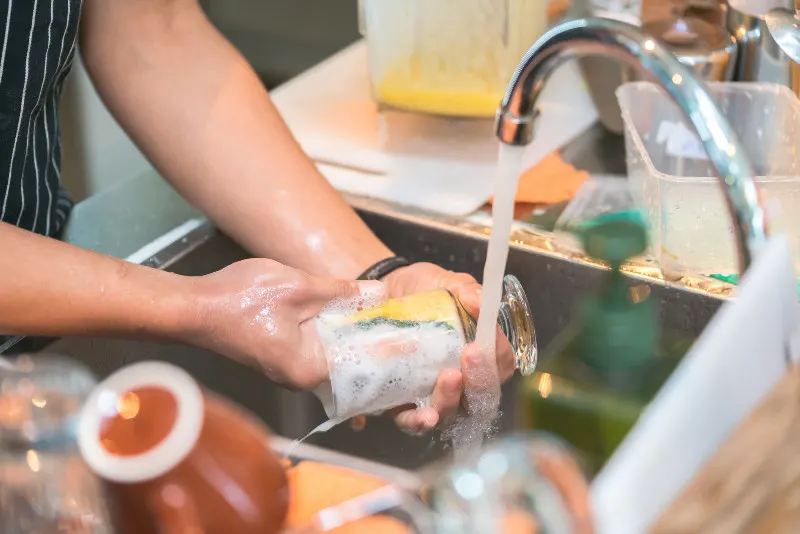
Delegate the Cleaning
In my household, the rule of thumb is this: if you cook, you don’t clean.
Usually, that means that I make dinner, my kids clear the table, and my husband does the dishes. Sometimes I help with putting away leftovers, but usually once dinner is over, I’m done with the kitchen.
If this system works for your family, great, but here are some other options to try out as well:
- whoever is not on bedtime duty does the dishes
- one person loads the dishwasher and the other does the dishes
- the kids are responsible for loading the dishwasher
- the kids do the dishes entirely
If you haven’t yet involved your kids in the cleaning, I highly recommend doing so for a couple of reasons: 1) just like cooking, cleaning is an important life skill to learn, 2) it is important for kids to understand that they are contributing members of the family as well, and 3) you deserve a break!
As for what age kids can start to help with cleaning the kitchen, here are some tips. By around age 4, kids should be able to clear their own dishes from the table and can start learning how to rinse the dishes.When they reach age 6, they can be washing dishes, with the exception of sharp objects that might get hidden by the soap suds. By age 8 or 10 (depending on your comfort level), you should be able to trust your kiddos with all the dishes.
The point is, you don’t have to do it all and you can get creative. So sit down with anyone in your household who is old enough to help and come up with a system that works for you.
Clean as You Go
While I know this means you still have to do the cleaning, one of my favorite tricks is to tidy up while I am waiting for the food to cook. This can include washing and/or rinsing dishes, loading the dishwasher with items that can be cleaned that way, and putting away ingredients that I’m done using. This gives me a chance to clear the decks and makes the pile after dinner much less daunting.
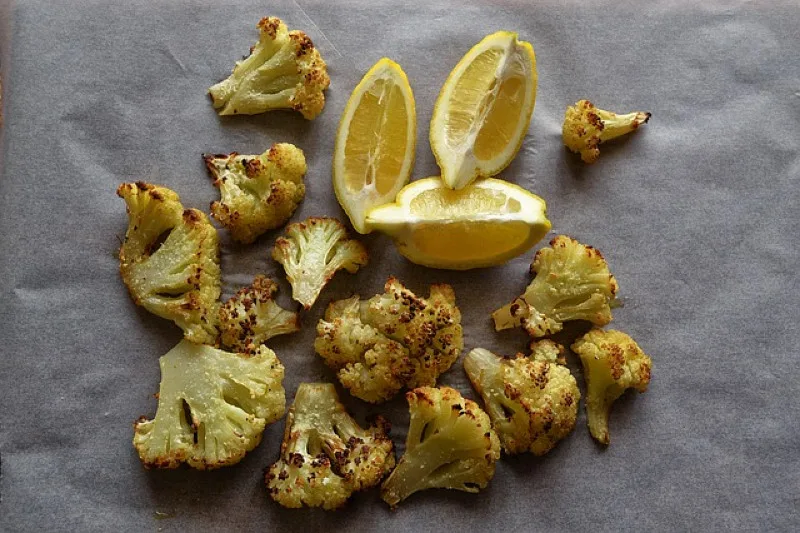
Parchment Paper for the Win
As far as I am concerned, parchment paper is one of the best inventions ever. I use it almost every time I pull out my baking sheets.
Whether it’s for baked goods like cookies and scones or for roasted vegetables, I almost always use parchment paper because it both prevents sticking and speeds up the cleaning. As long as there were no spills that got under the paper, I just rinse the baking sheet and call it a day.
I understand the concern that using parchment paper can be seen as wasteful. Here are some ways I try to work around that:
- I try to only buy parchment paper made from recycled paper
- if the paper didn’t get too gross the first time around, I try to save it to reuse another time
- if the paper doesn’t have food residue, then I will recycle it with my paper recycling. (Note: Non-stick foil is also a great option here as it can also be rinsed and recycled.)
Burned-On Crud (Part 1)
This one is a game changer. If you’ve got food burned onto the bottom of a pot or pan, here’s what to do:
- put a couple of drops of dish soap into the pot
- add enough water to cover the burned-on food
- bring the mixture to a boil on the stove
- turn off the heat, and allow the water to cool (when possible, I like to do this while we eat dinner)
- once the water is cooled, you will be overjoyed to see the food come right off!
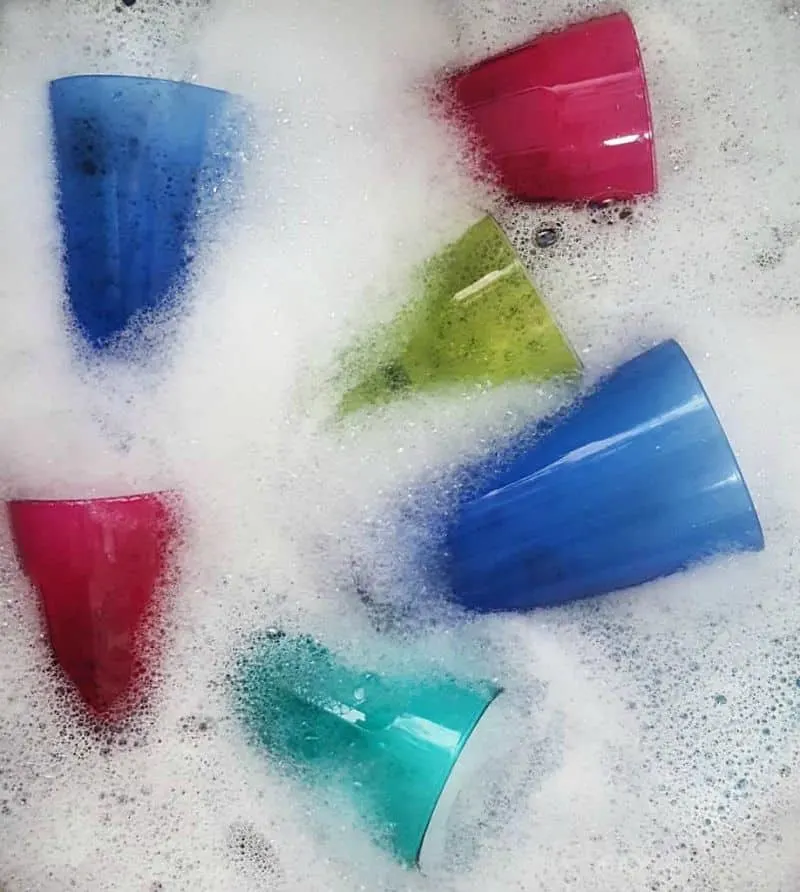
Burned-On Crud (Part 2): How to Clean a Cast Iron Skillet
Because cast iron shouldn’t be cleaned with soap, you want to treat these skillets a bit differently when they have food burned onto them. In my experience, the best option is to use a salt scrub. Here’s how to do it:
- pour a good deal of coarse salt into the skillet
- add a very small amount of water (enough to make a coarse paste)
- rub with a sponge or scouring pad and watch in wonder as the food falls away!
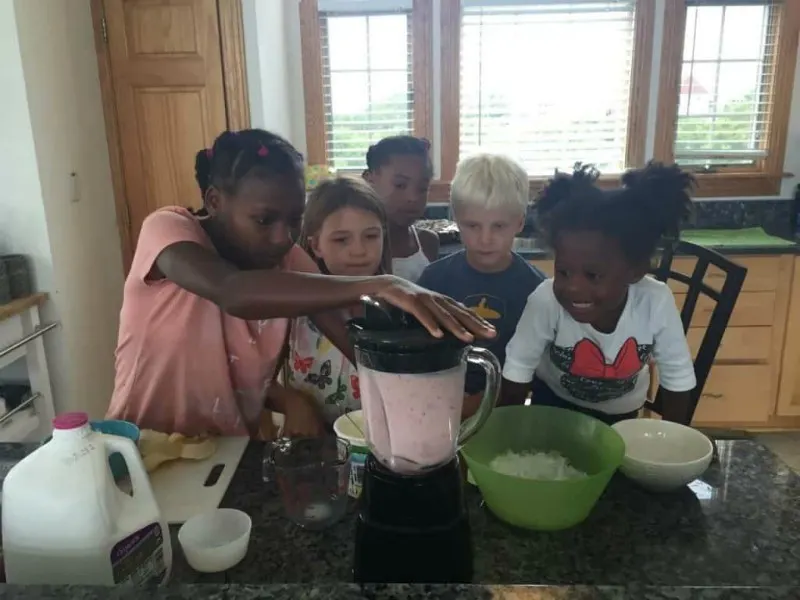
Let the Blender Wash Itself
Washing blenders used to be one of my least favorite tasks. Either you have to contend with a sharp blade at the bottom or you have to take the whole thing apart every time. Annoying! But then I discovered this trick:
- fill the blender halfway with hot water
- add a drop or two of dish soap
- put the top on
- flip the switch
- watch as the blender washes itself
- then all you have to do is rinse!
Use Cold Water to Rinse Dairy and Starchy Foods
Hot water makes dairy and starchy foods (like cooked on rice, potatoes, or pasta) gummy and harder to get off, so when you are soaking or washing something that has a dairy or starch residue, make sure to use cold water.
Finally, Make it Fun!
Play fun music and dance while you clean, listen to a podcast, use a soap that smells nice and/or is kind to your hands so it feels like a spa treatment…you get the idea…
Do you have favorite tricks to make the cleaning after cooking easier? I’d love to hear about them in the comments!

10 Cooking Tips for Total Beginners
Saturday 18th of November 2023
[…] utensils, cutting boards, and bowls as you finish using them. This will prevent clutter and make cleaning up after cooking much […]